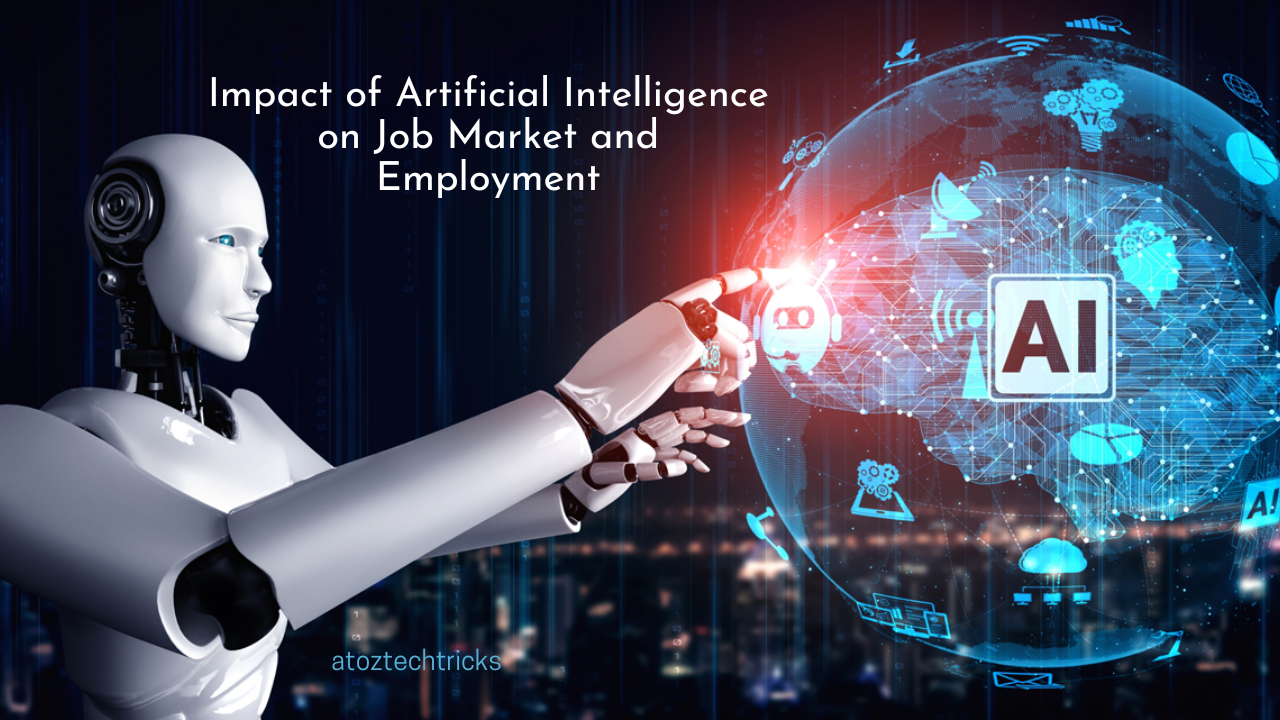Artificial Intelligence (AI) is no longer a futuristic concept but a present-day reality transforming various facets of our lives, including the job market and employment landscape. As AI technologies advance, they promise to revolutionize industries, redefine job roles, and create new opportunities while also presenting challenges and disruptions. This article explores the multifaceted impact of AI on job markets and employment, analyzing both the positive and negative aspects and offering insights into navigating the evolving workforce.
1. Introduction to AI and Its Evolution
Artificial Intelligence refers to the simulation of human intelligence in machines that are programmed to think and learn. Historically, AI began with simple rule-based systems but has evolved into complex algorithms capable of learning from data, recognizing patterns, and making decisions. Key advancements include machine learning, natural language processing, and robotics.
These developments have led to AI being integrated into diverse sectors, from healthcare and finance to manufacturing and retail. The growing prevalence of AI in various industries necessitates a closer examination of its impact on the job market and employment.

2. AI-Driven Job Creation
Despite concerns about job displacement, AI is also a powerful driver of job creation. The rise of AI technologies has led to the emergence of entirely new fields and job roles. Here are some examples:
a. AI and Machine Learning Specialists
As AI technologies become more sophisticated, there is an increasing demand for AI and machine learning specialists. These professionals are responsible for developing, implementing, and maintaining AI systems. Their expertise is crucial for designing algorithms, managing data, and ensuring the ethical use of AI.
b. Data Scientists and Analysts
The proliferation of AI has significantly increased the need for data scientists and analysts. These roles involve analyzing large datasets to extract valuable insights and inform decision-making. Data scientists work with AI tools to build predictive models and optimize processes, contributing to various business functions.
c. AI Ethics and Compliance Officers
With the ethical implications of AI gaining attention, new roles focusing on AI ethics and compliance are emerging. These professionals ensure that AI systems are used responsibly, addressing issues such as bias, privacy, and transparency. They play a crucial role in developing guidelines and policies for the ethical deployment of AI technologies.
d. AI Integration and Support Roles
AI integration into existing systems requires support roles that specialize in adapting and implementing AI solutions within organizations. This includes AI project managers, integration specialists, and technical support staff who ensure that AI systems are effectively integrated into business operations.
How Virtual Reality is Changing the Way We Experience Art and Culture
3. Transformation of Existing Job Roles
AI is also transforming traditional job roles, augmenting human capabilities and changing the way work is performed. Key areas of transformation include:
a. Automation of Repetitive Tasks
AI-powered automation has streamlined many repetitive and mundane tasks across various industries. In manufacturing, robots and AI systems handle routine assembly line tasks, improving efficiency and accuracy. Similarly, in administrative roles, AI tools automate data entry, scheduling, and report generation, allowing employees to focus on more strategic activities.
b. Enhanced Decision-Making
AI enhances decision-making by providing data-driven insights and predictive analytics. For instance, in finance, AI algorithms analyze market trends and generate investment recommendations. In healthcare, AI assists doctors by analyzing medical images and suggesting diagnoses. This augmentation of decision-making processes allows professionals to make more informed and timely decisions.
c. Personalized Customer Service
AI-driven chatbots and virtual assistants have revolutionized customer service by providing personalized and efficient support. These AI systems handle routine customer inquiries, offer recommendations, and resolve issues, freeing up human agents to address more complex and nuanced customer needs.

4. Challenges and Disruptions
While AI presents numerous opportunities, it also brings challenges and disruptions to the job market. Understanding these challenges is essential for preparing for the future of work.
a. Job Displacement and Redundancy
One of the primary concerns surrounding AI is job displacement. As AI systems take over routine tasks, some job roles may become redundant. For example, in manufacturing, robots may replace assembly line workers, and in administrative roles, AI tools may reduce the need for clerks and data entry operators. This displacement can lead to job losses and require workers to transition to new roles or industries.
b. Skills Gap and Workforce Reskilling
The rapid advancement of AI creates a skills gap as existing workers may lack the necessary expertise to work with new technologies. To address this, reskilling and upskilling initiatives are crucial. Workers need to acquire new skills in AI-related fields, such as programming, data analysis, and AI ethics. Organizations and educational institutions play a vital role in providing training and development opportunities.
c. Economic Inequality
AI-driven changes in the job market may exacerbate economic inequality. High-skilled workers with expertise in AI and related fields may benefit from increased job opportunities and higher wages, while low-skilled workers may face job insecurity and reduced earning potential. Addressing this inequality requires targeted policies and support for vulnerable workers.
Exploring the Potential of Edge Computing in Modern Networks
5. Strategies for Adapting to the AI-Driven Job Market
To navigate the evolving job market shaped by AI, individuals, organizations, and policymakers must adopt strategies that promote adaptability and resilience.
a. Emphasizing Lifelong Learning
Lifelong learning is essential for staying relevant in an AI-driven job market. Individuals should continuously update their skills and knowledge to keep pace with technological advancements. Online courses, certifications, and workshops provide valuable opportunities for professional development.
b. Fostering Collaboration Between Humans and AI
Rather than viewing AI as a replacement for human workers, it is beneficial to focus on how humans and AI can collaborate effectively. AI can handle routine and data-intensive tasks, while humans can focus on creativity, problem-solving, and interpersonal skills. Emphasizing collaboration between humans and AI enhances productivity and job satisfaction.
c. Supporting Workforce Transition
Policymakers and organizations should support workforce transitions by providing resources and support for displaced workers. This includes offering career counselling, job placement services, and financial assistance during periods of unemployment. Additionally, investment in education and training programs helps workers acquire the skills needed for new job opportunities.
d. Promoting Ethical AI Development
Ethical considerations should guide the development and deployment of AI technologies. Organizations should prioritize transparency, fairness, and accountability in their AI systems. By addressing ethical concerns, organizations can build trust and ensure that AI technologies benefit society as a whole.
6. Case Studies of AI Impact on Different Sectors
Examining real-world examples of AI impact can provide valuable insights into how different sectors are adapting to technological changes.
a. Healthcare
AI has significantly impacted healthcare by improving diagnostics, personalized treatment, and administrative efficiency. For example, AI algorithms can analyze medical images with high accuracy, assisting radiologists in detecting abnormalities. AI-powered chatbots provide patients with medical information and appointment scheduling, streamlining administrative tasks.
b. Finance
In the finance sector, AI is transforming investment strategies, fraud detection, and customer service. AI algorithms analyze market data to generate investment insights and automate trading decisions. Additionally, AI systems detect fraudulent transactions by analyzing patterns and anomalies, enhancing security.
c. Retail
Retailers are using AI to enhance customer experiences and optimize operations. AI-powered recommendation engines provide personalized product suggestions based on browsing and purchase history. Additionally, AI-driven inventory management systems predict demand and optimize stock levels, reducing waste and improving efficiency.
7. Future Trends and Considerations
As AI continues to evolve, several trends and considerations will shape the future of the job market and employment:
a. Growth of AI in Emerging Industries
AI is expected to play a significant role in emerging industries such as autonomous vehicles, renewable energy, and smart cities. These industries will create new job opportunities and drive innovation. For example, the development of autonomous vehicles will require roles in AI development, sensor technology, and regulatory compliance.
b. Ethical and Regulatory Frameworks
The development of ethical and regulatory frameworks for AI will be crucial in addressing concerns related to privacy, bias, and accountability. Governments and organizations need to establish guidelines and standards for responsible AI use to ensure that technologies are deployed in a manner that benefits society and minimizes risks.
c. Global Collaboration and Knowledge Sharing
Global collaboration and knowledge sharing will be essential for addressing the challenges and opportunities presented by AI. International cooperation can facilitate the exchange of best practices, research findings, and policy approaches. Collaborative efforts can also address global issues such as AI ethics, workforce development, and economic inequality.
The impact of artificial intelligence on job markets and employment is profound and multifaceted. While AI presents opportunities for job creation, enhanced decision-making, and increased efficiency, it also poses challenges such as job displacement, skills gaps, and economic inequality. Navigating the AI-driven job market requires a proactive approach, emphasizing lifelong learning, collaboration, and ethical considerations.
By embracing the potential of AI and addressing its challenges, individuals, organizations, and policymakers can shape a future where AI contributes to a dynamic and inclusive job market. The ongoing evolution of AI technologies will continue to redefine the nature of work, and understanding these changes is crucial for adapting to the future of employment.




